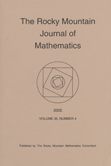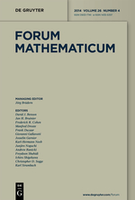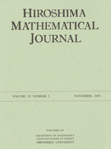
CUBO-A Mathematical Journal
Scope & Guideline
Empowering Emerging Voices in Mathematical Sciences
Introduction
Aims and Scopes
- Mathematical Analysis and Inequalities:
The journal frequently publishes papers that explore mathematical inequalities, approximation theory, and their applications in various mathematical contexts. - Differential Equations and Dynamical Systems:
A significant portion of the research focuses on both ordinary and fractional differential equations, including boundary value problems, stability analysis, and control theory, showcasing the journal's commitment to understanding complex dynamical systems. - Geometry and Topology:
The journal includes articles on geometric structures, manifolds, and topological properties, reflecting a strong interest in the interplay between algebraic and geometric concepts. - Algebra and Functional Analysis:
Research on algebraic structures, including rings, algebras, and operator theory, is prevalent, indicating the journal's focus on foundational mathematical principles. - Numerical Methods and Computational Mathematics:
There is an emphasis on developing numerical techniques for solving mathematical problems, particularly in the context of differential equations and optimization, highlighting the journal's relevance to applied mathematics.
Trending and Emerging
- Fractional Calculus and Differential Equations:
There is a notable increase in research addressing fractional calculus, particularly in the context of differential equations, indicating a growing interest in this area due to its applications in various fields such as physics and engineering. - Stochastic and Impulsive Differential Equations:
Recent papers have increasingly focused on stochastic processes and impulsive systems, reflecting an emerging interest in the complexities of modeling real-world phenomena with inherent uncertainty. - Geometric Analysis and Generalized Manifolds:
An upsurge in research related to geometric structures, particularly those involving generalized or fractional manifolds, suggests a trend towards exploring more complex geometric frameworks and their implications in mathematical physics. - Numerical Techniques for Complex Systems:
The journal is witnessing a growing trend in the development and analysis of numerical methods tailored for complex mathematical models, highlighting the need for effective computational strategies in handling intricate problems. - Operator Theory and Functional Analysis:
An increasing number of publications dedicated to operator theory and its applications in functional analysis indicates a trend towards exploring the analytical foundations of various mathematical constructs.
Declining or Waning
- Classical Algebraic Structures:
Papers focusing on classical algebraic topics, such as basic group theory and elementary ring theory, have seen a decline, possibly indicating a shift towards more complex structures and applications. - Elementary Number Theory:
Research in elementary aspects of number theory seems to be less frequent, suggesting a possible transition towards more applied or computational approaches in the field. - Basic Combinatorial Problems:
Topics in basic combinatorial theory and classical graph theory appear to be waning, with fewer papers addressing foundational combinatorial concepts, indicating a shift towards more complex combinatorial structures and their applications.
Similar Journals

INDIAN JOURNAL OF PURE & APPLIED MATHEMATICS
Elevating Research Standards in MathematicsINDIAN JOURNAL OF PURE & APPLIED MATHEMATICS, published by the INDIAN NATIONAL SCIENCE ACADEMY, stands as a vital resource in the realm of pure and applied mathematics since its inception in 1996. With ISSN 0019-5588 and E-ISSN 0975-7465, this journal aims to disseminate original research that advances the understanding and application of mathematical principles. Operating out of New Delhi, India, it serves a diverse readership comprising researchers, scholars, and practitioners in the mathematical sciences. Recognized within the Q3 category in both Applied Mathematics and Miscellaneous Mathematics as per the 2023 category quartiles, the journal emphasizes rigorous peer-reviewed articles that contribute to its impact in academia, reflected in its Scopus rankings. Although it does not currently operate as an open-access journal, it maintains a commitment to quality and accessibility of scholarly content, striving to foster academic collaboration and innovation. The convergence of full-text issues from 1996 to 2024 highlights its ongoing dedication to the evolution of mathematical research.

ROCKY MOUNTAIN JOURNAL OF MATHEMATICS
Championing Rigorous Research in MathematicsROCKY MOUNTAIN JOURNAL OF MATHEMATICS, published by the Rocky Mountain Math Consortium, serves as a critical platform for researchers and practitioners in the field of mathematics since its inception in 1971. With a notable presence in the academic community, this journal covers a broad spectrum of mathematical disciplines, positioning itself in the Q2 category for Mathematics (miscellaneous) as of 2023. Despite being a subscription-based journal, it is recognized for its rigorous peer-review process and contributions to theoretical and applied mathematics, helping to advance knowledge and foster collaboration among mathematicians. The journal's ISSN number is 0035-7596 and its E-ISSN is 1945-3795, reflecting its commitment to accessibility and dissemination of high-quality research. Based in Tempe, Arizona, at Arizona State University, the journal continues to play an important role in shaping contemporary mathematical discourse through well-researched articles and innovative studies, aiming to bridge gaps between various mathematical subfields and engage a diverse audience, including students and established researchers alike.

Ukrainian Mathematical Journal
Pioneering Insights in MathematicsThe Ukrainian Mathematical Journal is a prominent academic publication in the field of mathematics, focusing on a diverse range of topics that appeal to researchers, professionals, and students alike. Published by Springer, this journal has been an important platform for disseminating significant mathematical research since its inception in 1957. With the aim of fostering knowledge and collaboration within the mathematical community, the journal curates high-quality articles that meet rigorous scholarly standards, evidenced by its Q3 ranking in the miscellaneous mathematics category for 2023. Although it currently does not offer open access, the journal remains accessible through various institutional subscriptions. It serves as a vital resource for ongoing discourse in the field and invites contributions that further advance mathematical understanding.

Pure and Applied Mathematics Quarterly
Exploring the Depths of Theoretical and Practical MathematicsPure and Applied Mathematics Quarterly is a prestigious journal published by INT PRESS BOSTON, INC, focusing on the diverse and evolving field of mathematics. Since its inception in 2007, this journal has grown significantly, currently holding a Q1 ranking in the Mathematics (Miscellaneous) category for 2023, positioning it among the leading publications in the discipline. With a commitment to publishing high-quality research, Pure and Applied Mathematics Quarterly fosters innovation and dialogue within the mathematical community by providing a platform for theoretical advancements and practical applications. The journal remains accessible to researchers and professionals through its ISSN 1558-8599 and E-ISSN 1558-8602, although it does not currently offer open access. As a vital resource for mathematicians, educators, and students, this journal endeavors to expand the frontiers of mathematical knowledge and contribute to the academic dialogue surrounding this fundamental science.

FORUM MATHEMATICUM
Championing Rigorous Analysis and Methodologies in MathematicsFORUM MATHEMATICUM, published by WALTER DE GRUYTER GMBH, is a distinguished academic journal based in Germany, known for its significant contributions to the field of mathematics. With an ISSN of 0933-7741 and an E-ISSN of 1435-5337, the journal features comprehensive studies ranging from applied mathematics to diverse mathematical disciplines. Having maintained a commendable presence since 1989, FORUM MATHEMATICUM has achieved notable classification rankings, including Q2 in Applied Mathematics and Q1 in miscellaneous Mathematics as of 2023. Additionally, it holds a Scopus rank within the top 60th percentile in General Mathematics, making it a prominent platform for researchers and professionals seeking rigorous analysis and innovative methodologies in mathematics. While the journal does not currently offer open access, its rich content is pivotal for advancing mathematical theory and applications, appealing to students and seasoned academics alike.

Hiroshima Mathematical Journal
Exploring the Depths of Algebra, Analysis, and BeyondThe Hiroshima Mathematical Journal, published by Hiroshima University, Graduate School of Science, serves as a prominent platform for disseminating high-quality research in the field of mathematics. Established in 1959, the journal has been an integral part of the mathematical community, focusing on areas such as Algebra, Number Theory, Analysis, and Geometry and Topology. Although currently classified in Q4 quartile rankings within its categories, the journal is committed to advancing mathematical knowledge and fostering scholarly dialogue. Its accessibility, combined with its long-standing history, makes it an essential resource for researchers, professionals, and students dedicated to exploring and enhancing the mathematical sciences. For those interested in contributing or accessing cutting-edge research, the Hiroshima Mathematical Journal continues to uphold its mission of excellence in mathematical scholarship.

ANNALES DE L INSTITUT FOURIER
Advancing Mathematical FrontiersANNALES DE L INSTITUT FOURIER is a premier academic journal published by ANNALES INST FOURIER, specializing in the fields of Algebra and Number Theory as well as Geometry and Topology. Since its establishment, the journal has garnered a distinguished reputation, evidenced by its Q1 quartile ranking in the 2023 category assessments and its Scopus Rank of #37 out of 119 in Algebra and Number Theory, and #34 out of 106 in Geometry and Topology, placing it within the top percentile of its field. The journal serves as a vital platform for disseminating groundbreaking research and innovative methodologies, catering to a global audience of researchers, professionals, and students. With a commitment to the advancement of mathematical sciences, ANNALES DE L INSTITUT FOURIER invites contributions that push the boundaries of knowledge and foster collaboration across disciplines. Although it does not offer open access, the rigorous peer-review process ensures that published papers meet the highest academic standards, making it a critical resource for anyone engaged in advanced mathematical research.

European Journal of Mathematics
Empowering the Next Generation of MathematiciansWelcome to the European Journal of Mathematics, a prominent publication that serves as a vital platform for disseminating high-quality research in the field of mathematics. Published by Springer International Publishing AG, this journal has witnessed significant growth since its inception in 2015 and is recognized for its contributions within the Q2 category of Mathematics (miscellaneous) as per the 2023 rankings. With an ISSN of 2199-675X and an E-ISSN of 2199-6768, the journal aims to foster innovation and collaboration among researchers, professionals, and students alike. Although it operates under a traditional access model, the journal's commitment to advancing mathematical knowledge and applications cannot be overstated. Positioned among the top-tier publications, the European Journal of Mathematics is an essential resource that encourages the exploration of emerging trends and theories in mathematics, making it indispensable for anyone striving to stay at the forefront of this dynamic field.

Russian Mathematics
Advancing the Frontiers of MathematicsRussian Mathematics is an esteemed journal published by PLEIADES PUBLISHING INC, specializing in the field of mathematics. With its ISSN 1066-369X and E-ISSN 1934-810X, this journal serves as a vital platform for disseminating innovative research and advancements in various branches of mathematics. Established in 1992, it has earned its place in the Q2 category of the mathematics (miscellaneous) discipline, reflecting its growing influence and reputation within the academic community. Although it is not an open-access journal, its rigorous selection process ensures that only high-quality research is published, making it an invaluable resource for researchers, professionals, and students seeking in-depth insights into mathematical theories and applications. The journal has documented its evolution through a converged years format from 2010 to 2024, emphasizing its commitment to fostering scholarly discourse. With its address located at PLEIADES HOUSE, 7 W 54 ST, NEW YORK, NY 10019, UNITED STATES, Russian Mathematics is poised to contribute significantly to the global mathematical community.

Analele Stiintifice ale Universitatii Ovidius Constanta-Seria Matematica
Empowering Researchers through Accessible Mathematical KnowledgeAnalele Stiintifice ale Universitatii Ovidius Constanta-Seria Matematica is a prominent open-access journal established by OVIDIUS UNIV PRESS in Romania, dedicated to advancing the fields of mathematics, specifically in Analysis and Applied Mathematics. Since its inception, the journal has emphasized the dissemination of high-quality research, making it accessible to a global audience. With an ISSN of 1224-1784 and E-ISSN 1844-0835, it has positioned itself within the academic community, achieving a respectable Q3 ranking in both analysis and applied mathematics in 2023, reflecting its commitment to rigorous scholarship. The journal spans a considerable publication window from 2009 to 2024, catering to the ongoing developments in mathematical sciences and their applications. Researchers, professionals, and students alike will find valuable insights and contributions that enrich their understanding and foster collaboration within the mathematical community. The journal's headquarters is based at the Faculty of Mathematics & Computer Science, Bulevardul Mamaia 124, Constanta, Romania.